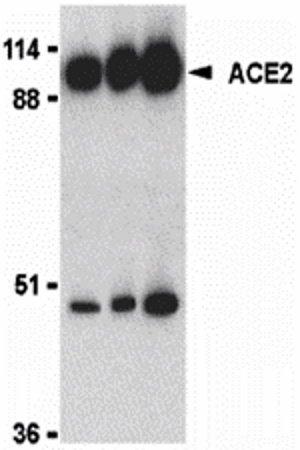ACE2 Antibody

Figure-1: Western blot analysis of ACE2. Anti- ACE2 antibody (35-1877) was used at 0.5, 1, 2 µg/ml on human kidney lysate.
Roll over image to zoom in
Shipping Info:
For estimated delivery dates, please contact us at [email protected]
| Format : | Purified |
| Amount : | 100 µl |
| Isotype : | Rabbit IgG |
| Purification : | Affinity chromatography purified via peptide column. |
| Content : | Supplied in PBS containing 0.02% sodium azide. |
| Storage condition : | Stored at -20˚C, stable for one year. As with all antibodies care should be taken to avoid repeated freeze thaw cycles. Antibodies should not be exposed to prolonged high temperatures. |
| Gene : | ACE2 |
| Gene ID : | 59272 |
| Uniprot ID : | Q9BYF1 |
| Alternative Name : | ACEH antibody; DKFZp434A014 antibody; ACE2 antibody; metalloprotease MPROT15 antibody; angiotensin-converting enzyme homolog antibody; angiotensin I converting enzyme 2 antibody; ACE-related carboxypeptidase antibody; angiotensin-converting enzyme 2 antibody |
| Immunogen Information : | This Antibody was raised against a synthetic peptide corresponding to amino acids near the C-terminus of human ACE2. |
Angiotensin-converting enzyme 2 (ACE2) plays a central role in vascular, renal, and myocardial physiology. In contrast to its homolog ACE, ACE2 expression is restricted to heart, kidney, and testis. Recently. ACE2 has also been shown to be a functional receptor of the SARS coronavirus. The normal function of ACE2 is to convert the inactive vasoconstrictor angiotensin I (AngI) to Ang1-9 and the active form AngII to Ang1-7, unlike ACE, which converts AngI to AngII. While the role of these vasoactive peptides is not well understood, lack of ACE2 expression in ace2-/ace2- mice leads to severely reduced cardiac contractility, indicating its importance in regulating heart function.
Western blotting analysis: 0.5-2 µg/ml, Immunohistochemical analysis-2-4 µg/ml
For Research Use Only. Not for use in diagnostic/therapeutics procedures.
|
There are currently no product reviews
|















.png)













